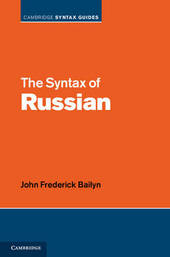
|
The Syntax of Russian
Hardback
Main Details
| Title |
The Syntax of Russian
|
| Authors and Contributors |
By (author) John Frederick Bailyn
|
| Series | Cambridge Syntax Guides |
|---|
| Physical Properties |
| Format:Hardback | | Pages:392 | | Dimensions(mm): Height 235,Width 156 |
|
| Category/Genre | Grammar and syntax |
|---|
| ISBN/Barcode |
9780521885744
|
| Classifications | Dewey:491.75 |
|---|
| Audience | | Professional & Vocational | |
|---|
|
Publishing Details |
| Publisher |
Cambridge University Press
|
| Imprint |
Cambridge University Press
|
| Publication Date |
27 October 2011 |
| Publication Country |
United Kingdom
|
Description
The study of Russian is of great importance to syntactic theory, due in particular to its unusual case system and its complex word order patterns. This book provides an essential guide to Russian syntax and examines the major syntactic structures of the language. It begins with an overview of verbal and nominal constituents, followed by major clause types, including null-copular and impersonal sentences, WH-questions and their distribution, and relative and subordinate clauses. The syntax behind the rich Russian morphological case system is then described in detail, with focus on both the fairly standard instances of Nominative, Accusative and Dative case as well as the important language-specific uses of the Genitive and Instrumental cases. The book goes on to analyze the syntax of 'free' word order for which Russian is famous. It will be of interest to researchers and students of syntactic theory, of Slavic linguistics and of language typology.
Author Biography
John Frederick Bailyn is Professor of Linguistics at Stony Brook University. He is the author of numerous articles and edited volumes on formal Slavic linguistics especially in the areas of case, word order, functional categories, syntactic microvariation and binding.
Reviews' ... this book will be an invaluable resource for researchers and students of syntactic theory, of Slavic linguistics, and of language typology ... The Syntax of Russian makes a significant contribution to the field of Russian language and linguistics and will serve as an important reference source for researchers and students alike.' Journal of Linguistics
|